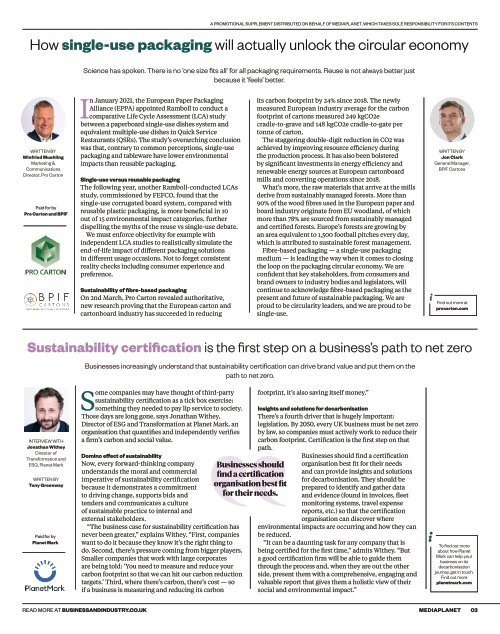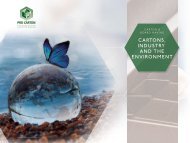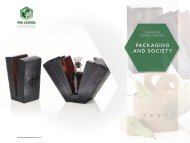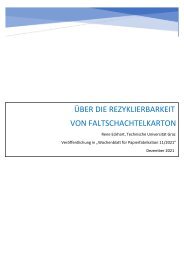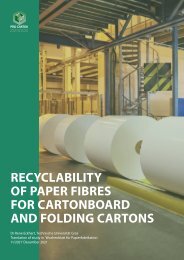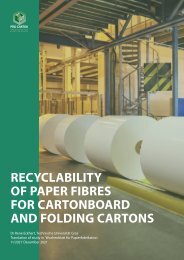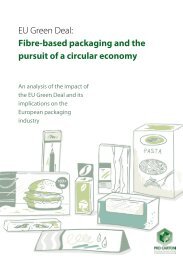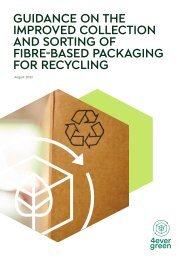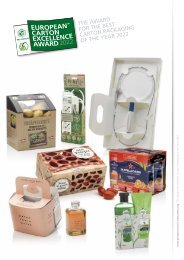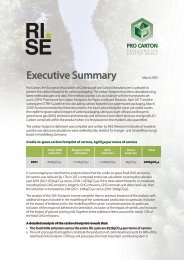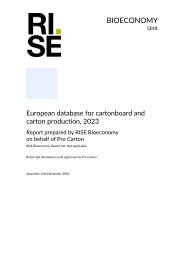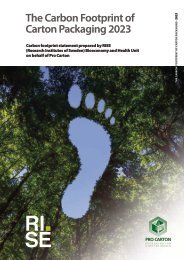2023 Sustainable Living Media Planet Supplement
Create successful ePaper yourself
Turn your PDF publications into a flip-book with our unique Google optimized e-Paper software.
A PROMOTIONAL SUPPLEMENT DISTRIBUTED ON BEHALF OF MEDIAPLANET, WHICH TAKES SOLE RESPONSIBILITY FOR ITS CONTENTS<br />
How single-use packaging will actually unlock the circular economy<br />
Science has spoken. There is no ‘one size fits all’ for all packaging requirements. Reuse is not always better just<br />
because it ‘feels’ better.<br />
WRITTEN BY<br />
Winfried Muehling<br />
Marketing &<br />
Communications<br />
Director, Pro Carton<br />
Paid for by<br />
Pro Carton and BPIF<br />
In January 2021, the European Paper Packaging<br />
Alliance (EPPA) appointed Ramboll to conduct a<br />
comparative Life Cycle Assessment (LCA) study<br />
between a paperboard single-use dishes system and<br />
equivalent multiple-use dishes in Quick Service<br />
Restaurants (QSRs). The study’s overarching conclusion<br />
was that, contrary to common perceptions, single-use<br />
packaging and tableware have lower environmental<br />
impacts than reusable packaging.<br />
Single-use versus reusable packaging<br />
The following year, another Ramboll-conducted LCAs<br />
study, commissioned by FEFCO, found that the<br />
single-use corrugated board system, compared with<br />
reusable plastic packaging, is more beneficial in 10<br />
out of 15 environmental impact categories, further<br />
dispelling the myths of the reuse vs single-use debate.<br />
We must enforce objectivity for example with<br />
independent LCA studies to realistically simulate the<br />
end-of-life impact of different packaging solutions<br />
in different usage occasions. Not to forget consistent<br />
reality checks including consumer experience and<br />
preference.<br />
Sustainability of fibre-based packaging<br />
On 2nd March, Pro Carton revealed authoritative,<br />
new research proving that the European carton and<br />
cartonboard industry has succeeded in reducing<br />
its carbon footprint by 24% since 2018. The newly<br />
measured European industry average for the carbon<br />
footprint of cartons measured 249 kgCO2e<br />
cradle-to-grave and 148 kgCO2e cradle-to-gate per<br />
tonne of carton.<br />
The staggering double-digit reduction in CO2 was<br />
achieved by improving resource efficiency during<br />
the production process. It has also been bolstered<br />
by significant investments in energy efficiency and<br />
renewable energy sources at European cartonboard<br />
mills and converting operations since 2018.<br />
What’s more, the raw materials that arrive at the mills<br />
derive from sustainably managed forests. More than<br />
90% of the wood fibres used in the European paper and<br />
board industry originate from EU woodland, of which<br />
more than 78% are sourced from sustainably managed<br />
and certified forests. Europe’s forests are growing by<br />
an area equivalent to 1,500 football pitches every day,<br />
which is attributed to sustainable forest management.<br />
Fibre-based packaging — a single-use packaging<br />
medium — is leading the way when it comes to closing<br />
the loop on the packaging circular economy. We are<br />
confident that key stakeholders, from consumers and<br />
brand owners to industry bodies and legislators, will<br />
continue to acknowledge fibre-based packaging as the<br />
present and future of sustainable packaging. We are<br />
proud to be circularity leaders, and we are proud to be<br />
single-use.<br />
WRITTEN BY<br />
Jon Clark<br />
General Manager,<br />
BPIF Cartons<br />
Find out more at<br />
procarton.com<br />
Sustainability certification is the first step on a business’s path to net zero<br />
Businesses increasingly understand that sustainability certification can drive brand value and put them on the<br />
path to net zero.<br />
INTERVIEW WITH<br />
Jonathan Withey<br />
Director of<br />
Transformation and<br />
ESG, <strong>Planet</strong> Mark<br />
WRITTEN BY<br />
Tony Greenway<br />
Paid for by<br />
<strong>Planet</strong> Mark<br />
Some companies may have thought of third-party<br />
sustainability certification as a tick box exercise:<br />
something they needed to pay lip service to society.<br />
Those days are long gone, says Jonathan Withey,<br />
Director of ESG and Transformation at <strong>Planet</strong> Mark, an<br />
organisation that quantifies and independently verifies<br />
a firm’s carbon and social value.<br />
Domino effect of sustainability<br />
Now, every forward-thinking company<br />
understands the moral and commercial<br />
imperative of sustainability certification<br />
because it demonstrates a commitment<br />
to driving change, supports bids and<br />
tenders and communicates a culture<br />
of sustainable practice to internal and<br />
external stakeholders.<br />
“The business case for sustainability certification has<br />
never been greater,” explains Withey. “First, companies<br />
want to do it because they know it’s the right thing to<br />
do. Second, there’s pressure coming from bigger players.<br />
Smaller companies that work with large corporates<br />
are being told: ‘You need to measure and reduce your<br />
carbon footprint so that we can hit our carbon reduction<br />
targets.’ Third, where there’s carbon, there’s cost — so<br />
if a business is measuring and reducing its carbon<br />
Businesses should<br />
find a certification<br />
organisation best fit<br />
for their needs.<br />
footprint, it’s also saving itself money.”<br />
Insights and solutions for decarbonisation<br />
There’s a fourth driver that is hugely important:<br />
legislation. By 2050, every UK business must be net zero<br />
by law, so companies must actively work to reduce their<br />
carbon footprint. Certification is the first step on that<br />
path.<br />
Businesses should find a certification<br />
organisation best fit for their needs<br />
and can provide insights and solutions<br />
for decarbonisation. They should be<br />
prepared to identify and gather data<br />
and evidence (found in invoices, fleet<br />
monitoring systems, travel expense<br />
reports, etc.) so that the certification<br />
organisation can discover where<br />
environmental impacts are occurring and how they can<br />
be reduced.<br />
“It can be a daunting task for any company that is<br />
being certified for the first time,” admits Withey. “But<br />
a good certification firm will be able to guide them<br />
through the process and, when they are out the other<br />
side, present them with a comprehensive, engaging and<br />
valuable report that gives them a holistic view of their<br />
social and environmental impact.”<br />
To find out more<br />
about how <strong>Planet</strong><br />
Mark can help your<br />
business on its<br />
decarbonisation<br />
journey, get in touch.<br />
Find out more<br />
planetmark.com<br />
READ MORE AT BUSINESSANDINDUSTRY.CO.UK MEDIAPLANET 03


